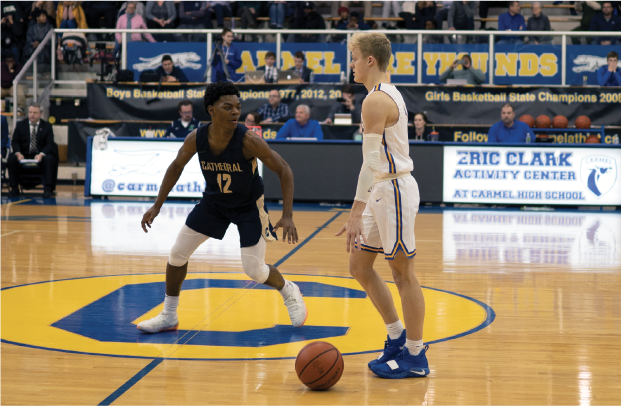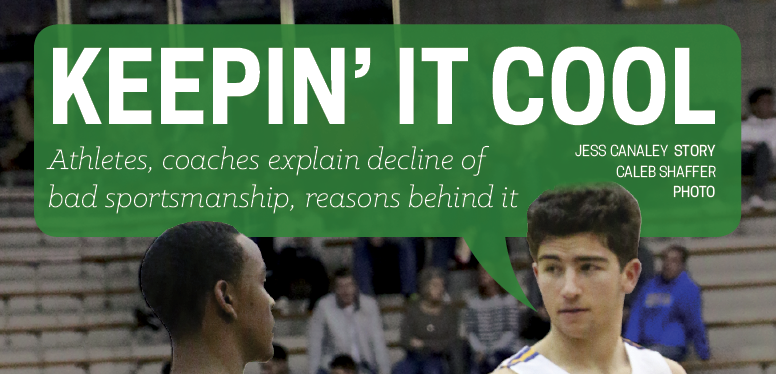Trash talking has long been a part of sports culture. However now, trash talking, especially in the sports world, seems to be decreasing. Ryan Osborn, head coach of the men’s basketball team, has been around the sport for almost his whole life. In his experience of playing the game and through his 10 years of coaching, Osborn said trash talk— insulting or boastful speech intended to demoralize, is actually less frequent from players or opponents than one might think.

LEADING THE TEAM:
Karsten Windlan, point guard and senior, talks to his team during their game against Cathedral High School. Head Coach Ryan Osborn said the team focuses on limiting bad interactions between opposing athletes during any games.
“I think it’s cleaned up a little bit,” Osborn said. “If you go back to the early ‘90s and watched some NBA games where it’s Michael Jordan and some of those guys, there were fist fights in games. It was really physical. Now I think there’s more attention brought to (trash talk) because of social media, maybe, and the ability to get stuff out so quickly and to a lot of people.”
Athletics Director Jim Inskeep said he agrees with Osborn in that he too has noticed a decrease in unsportsmanlike behavior throughout his 18 years of experience. Inskeep said he thinks social media plays a major role.
“In the last 20 years I’ve seen much more sportsmanlike behavior between kids than ever before because they have had a big push for sportsmanship from their coaches and all the different campaigns that have been out there,” Inskeep said. “If you think you’re going to misbehave at an event and someone’s not going to video that or capture that moment, then that’s a pretty bad plan. Anything that’s out there any more that can be perceived as negative is put out there for all the world to see.”
John Michael Mulloy, senior and varsity basketball player, said social media has not only curbed trash talk, but it also can speak for who the opponent and player is as a person.
“Social media definitely can show the type of person someone is. How they act, who they aspire to be is reflected in what they post,” Mulloy said.
Osborn said he tries to emphasize the importance of knowing how to deal with emotions appropriately during games to his players. While he notes the overall frequency of trash talk seems to be going down, Osborn said it’s still important to teach his players how to handle themselves well.
“If you train to react in the right way, it’s fine, but if you’re not familiar with (the situation), negativity can come out of it. I think you’ll see the teams that are most successful are the ones that don’t involve themselves in that kind of stuff. They’re more focused on accomplishing what their team needs them to do,” Osborn said. “At the end of the day, the trash talk and the emotional stuff is selfish and self-directed. It’s hard to have a good team environment if you allow or have anybody that feeds into trash talk or negative emotions or bad body language.”
Mulloy said he agrees and noted the importance of knowing how to handle these situations.
“There’s always a lot of talk. There’s different kids with different personalities in both good and bad ways; you have to know how to handle yourself in possible bad situations,” Mulloy said.
Still, according to Inskeep, while trash talking among students has seen improvement in past years, the crowd and parent interactions continue to deteriorate and is a conversation for the future.
“The stakes seem to be rising for adults as it relates to their attitude towards treating high school sports like it’s a professional venue, whether it be their criticism of teenagers playing high school athletics,” Inskeep said. “During football season you can’t hear most of (the negative talk) because the players are so far removed from the crowd. When you move indoors it becomes different. If you go to a basketball game, you can hear individuals yelling because you don’t have 4,000 individuals there where everything is drowned out by sound. It’s maybe 1,000 people or less and you can hear everything in the gym that’s above a normal conversation.”
Despite the shift in the culture of trash talking, Osborn said it’s still important for coaches to know how to handle player-to-player interactions and to properly prepare students to deal with them.
Osborn said, “You’re going to have some talk, it’s part of the game and the competition, but I’d like our players to have that edge to know how to handle it and use it in a positive way.”

































![AI in films like "The Brutalist" is convenient, but shouldn’t take priority [opinion]](https://hilite.org/wp-content/uploads/2025/02/catherine-cover-1200x471.jpg)









































![Review: “The Immortal Soul Salvage Yard:” A criminally underrated poetry collection [MUSE]](https://hilite.org/wp-content/uploads/2025/03/71cju6TvqmL._AC_UF10001000_QL80_.jpg)
![Review: "Dog Man" is Unapologetically Chaotic [MUSE]](https://hilite.org/wp-content/uploads/2025/03/dogman-1200x700.jpg)
![Review: "Ne Zha 2": The WeChat family reunion I didn’t know I needed [MUSE]](https://hilite.org/wp-content/uploads/2025/03/unnamed-4.png)
![Review in Print: Maripaz Villar brings a delightfully unique style to the world of WEBTOON [MUSE]](https://hilite.org/wp-content/uploads/2023/12/maripazcover-1200x960.jpg)
![Review: “The Sword of Kaigen” is a masterpiece [MUSE]](https://hilite.org/wp-content/uploads/2023/11/Screenshot-2023-11-26-201051.png)
![Review: Gateron Oil Kings, great linear switches, okay price [MUSE]](https://hilite.org/wp-content/uploads/2023/11/Screenshot-2023-11-26-200553.png)
![Review: “A Haunting in Venice” is a significant improvement from other Agatha Christie adaptations [MUSE]](https://hilite.org/wp-content/uploads/2023/11/e7ee2938a6d422669771bce6d8088521.jpg)
![Review: A Thanksgiving story from elementary school, still just as interesting [MUSE]](https://hilite.org/wp-content/uploads/2023/11/Screenshot-2023-11-26-195514-987x1200.png)
![Review: "When I Fly Towards You", cute, uplifting youth drama [MUSE]](https://hilite.org/wp-content/uploads/2023/09/When-I-Fly-Towards-You-Chinese-drama.png)
![Postcards from Muse: Hawaii Travel Diary [MUSE]](https://hilite.org/wp-content/uploads/2023/09/My-project-1-1200x1200.jpg)
![Review: "Ladybug & Cat Noir: The Movie," departure from original show [MUSE]](https://hilite.org/wp-content/uploads/2023/09/Ladybug__Cat_Noir_-_The_Movie_poster.jpg)
![Review in Print: "Hidden Love" is the cute, uplifting drama everyone needs [MUSE]](https://hilite.org/wp-content/uploads/2023/09/hiddenlovecover-e1693597208225-1030x1200.png)
![Review in Print: "Heartstopper" is the heartwarming queer romance we all need [MUSE]](https://hilite.org/wp-content/uploads/2023/08/museheartstoppercover-1200x654.png)





